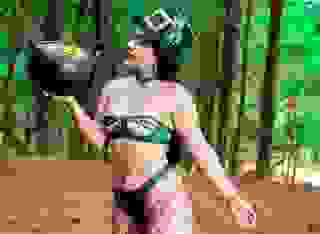Note: You can change font size, font face, and turn on dark mode by clicking the "A" icon tab in the Story Info Box.
You can temporarily switch back to a Classic Literotica® experience during our ongoing public Beta testing. Please consider leaving feedback on issues you experience or suggest improvements.
Click here"Demanding you sacrifice your own satisfaction?Expecting you to be selfless?" Meredith said. "As in, not like, This is a value we want you to learn, but rather, We won't love you unless you're this way?"
"Yeah," said Caitlyn, feeling stunned. "Yeah." That was it exactly. That was the life she had lived for twenty years, and she hadn't evenrealized it.
"Jon made a really interesting statement when we were talking to him," Christa said. "He said that the parents you live under are the people who most strongly influence your idea of what God is like."
"Well, yes," Caitlyn said. "Isn't thatalways how it starts out?" She had been brought to church by her parents, and she knew Jon had been brought as well by his; they must have taught him about Jesus and God, at least in the beginning... Come to think of it, maybe that explained his faith. Caitlyn liked her parents-in-law just fine, but no one could call them devout.
"No, it's not just that they teach you about God and get you to read the Bible," Christa said. "I mean, it's that, but it's notjust that. Jon said that our parentslive the role of God to us. When we're young, our parents create our idea of who and what God is supposed tobe."
Caitlyn was silent for long moments, mulling over this new thought. That smacked to her of idolatry; and certainly her parents (nor any parents she knew) had
never demanded their children worship them. But that was the whole point of Jesus, after all, the whole point of Christianity—that Christ had come down to earth tobe the example of how to live a God-like life, to model Christian/Godlike behavior. Now, obviously, parents weren't Jesus. But... Still. Wouldn't that assigning parents too much credit?
"I don't know," Christa answered, "it might be. But, think about everyone you know. What is Jon's conception of God, in comparison to how his parents treated him? What's yours?"
"I think Jon's in much the same boat as Brandon," Meredith said. "Which makes sense, because they've had similar experiences with their parents. Jon says he finds it hard to believe in the idea that God won't let him down if he puts his trust in Him, and Brandon understands that because both of them have been let down by many people, particularly their parents, before."
"And we don't evenknow how our friend Jane got to be the way she is," Christa said, "considering how much her parents had mellowed by the time we knew them, but... They were a lot like yours, Caitlyn. Manipulative. High expectations. And she turned out to have pretty low self-esteem, just like you."
"This self-esteem thing," Meredith said. "It's so tricky. On the one hand, you have all these cocksure crazy people with no conception of humility... And on the other you have people who have just been trodden into the dirt. It's like no one can ever get it right. But if your parents didn't teach you to have good self-esteem, it comes out. The only thing that varies ishow it comes out."
"I was lucky," Christa said, "and so was Zach. We both came out of our childhoods with a pretty good sense of ourselves. We both take it for granted, of course, because we just haven't lived with anything else; but now we look at the people around us and realize just how lucky we were. Our parents managed to... Well, they managed not to screw us up. That sounds so simple, but it's starting to seem like one of the rarest things there is."
Caitlyn nodded. "That's important to Jon too. And me. I just... I hate the idea of any child of ours growing up the way he and I did. ...Sheesh, listen to me. I make it sound like we lived in poverty or something. We didn't. We were comfortable. We had everything... Except love."
"Then why don't you give these new ideas a try?" Meredith said. "Maybe you're not convinced that it's right to stand up for yourself, to be selfish, but isn't it worth it to try it and find out? Because, if we're right, then clinging to your current modelwould lead to screwing up your kids. Do you really want to take that risk?"
"But... These are my parents," Caitlyn said. "They've been supporting me and taking care of me and... And everything. Foryears. Don't I owe it to them to please them?"
"Because they love you?" Christa said. "No."
"What?" said Meredith. "That sounds backwards."
"Didn't we tell you?" Christa said. "It was something Fr. Winston said. He said that most of our ideas of loveare completely backwards that way. When you love somebody, they don't owe you anything—because love is the most voluntary and subjective of emotions, he said, or something like that, and as such the lover is free to decide whether or not to love at all. But the beloved doesn't owe the lover anything, because the lover is making a rational choice, which implies a willingness to accept all consequences thereof. Instead, thelover feels called to serve the person he-or-she loves, because that's what loveis: a rational, voluntary choice to put the other person's needs first. It is given free of charge and with no obligation. It's the only truly free gift we ever get."
"I really do need to meet this Fr. Winston of yours," Meredith said. "He sounds like a very interesting person."
"So, no, Caitlyn," Christa said. "If your parents truly love you, they don't expect any recompense for their actions. Virtue truly is its own reward in this case. and, if theyare leaning on you to be appropriately grateful, then, well, they're trying to manipulate you. No one should have to pay for what is given freely."
"Yes, but, what if I lovethem?" Caitlyn said. "If I love them, I want to please them, right?... And if they tell me there's something I want done..."
"Fair enough, yes," said Meredith. "But that's when you have to decide."
"Decide what?"
"How far your love goes. Who you're actually willing to change yourself, or hurt yourself, for. Caitlyn, you know your parents don't actually love you. They love who they want you to be, not who you are. And this mythical Caitlyn they want you to be—you know enough about her to know that you wouldn't be happy if you became her. It would be an injury to yourself. Your parents may have your best interests in mind, but they still intend to chop off the best parts of who you are. Is that really what you want for yourself?"
"Especially since, remember, you're worthy of love just as you are," Christa said. "You have worth to a loving God, just the way you are. And if your parents don't love you, just the way you are, thenthey are the ones who have strayed from the path of Christ, not you. Jesus said to love even sinners. How then are you any less deserving of your parents' love?"
"And you haven't sinned," Meredith put in.
Caitlyn wasn't sure what to think. There were so many different forces spinning around in her head and crashing into each other like some deranged roller derby. But in the end, all she had to ask herself was one question:What would Jesus do?
Christa signaled for the check, and they left.
It was relatively quiet around the house until Mrs. Delaney returned at 3:30. Caitlyn pasted herself at her desk—the same one she'd used for so many years; the computer that had entertained so many desperate Instant-Messenger conversations with Jon—and tried to get something done about her homework, but there was no focus in her now; she didn't even have the gift of music to distract her, because all her instruments were at the apartment. Instead, all she had was her thoughts—and there were certainly enough of them to keep her busy.
For all her life, she had believed in the necessity of earning love; this had been hammered into her from an early age, until she breathed it in and out like air. It had taken Meredith's insight to remind her that she believed it. And, through all her life, she had never hesitated to do whatever she thought would earn her love; that too had been beaten into her. If she wasn't loved, her parents had told her, she was worthless; if she wasn't doing what they told her to, she wasn't loved. Itwas manipulative; it was cold and unfeeling. No wonder she had fallen so hard for Jon: he had taken one look at all of this and simply decided to love her differently. To love her, always and forever, come whatever storms.
It had worked, she realized. Hedid love her. And, of course, she loved him. Even if she never saw his face again, heard his voice, felt his touch—even if she divorced him and re-married and made a family with someone else—she would love him to her grave. In that moment of hope she knew that she had achieved the kind of storybook, fairy-tale love she had always wanted for herself. At any other time she might have found that comforting; now, in this place of desolation, it was not an entirely pleasant thought.
She had lived with her parents' way for her entire life, with Jon's for less than a tenth of it. She believed in some reckless place that her parents' way was the right one. But then why had she sought refuge in Jon's arms?—he, who was the antithesis of what her parents had taught her to believe? By all rights, she should have been miserable there; but it was the happiest she'd ever felt, the strongest and best she'd ever been. Was it true?—was her parents' way flawed?
The Thursday Fiasco seemed to say so. If her parents' rules were true, she should have been willing to go through with it no matter the discomfort to herself; instead she had selfishly demanded that Jon stop because she just didn't like it. If her parents' rules were true, the proper response for him would have been to threaten her, to bluster, to tell her how ungrateful she was that he was slaving night and day to pay for their apartment and her education and music lessons. Instead, he had simply agreed, had nodded and kissed her and did as she bade.
Jon loves me. Jon actually, really, honestly loves me. He said that, if I turned him down on the bum thing, he would swallow his disappointment and live with it. I didn't believe him, of course—not with the conditioning I've received—but he meant it. Because hewas disappointed, he must have been; it wasn't romantic or loving or even pleasurable for either of us, and he wouldn't have wanted to try it if he hadn't thought it might be some or all of those things. He must have been disappointed. But he never said anything more about it, except to ask if I was feeling all right. He really meant it. He really loves me.
And what about me? Shouldn't I, having done that thing for him, uncomfortable and unpleasant as it was, have been demanding all sorts of recompense from him? Shouldn't I, having just demonstrated my love for him in such an ostentatious way, have been demanding reward? —Heck, shouldn't I have been doing that foreverything in our sex life? Because I sure don't. Our lovemaking is always about giving—and more often than not, from me to him. ...And Ilike it that way. The whole dominance thing isabout the fact that I like giving to him. If my parents' rules are true, I should be begrudging him everything. Instead, I'm just giving it away. And, most of the time, feeling like I'm actually getting the better end of the bargain.
(Of course, I also doubt my parents everenjoyed sex the way Jon and I do.)
So. Where does that leave me?
Jon says I need to be selfish, but if Meredith and Christa are right, what he'sreally saying is that I need to be less generous with my willingness to earn people's love. What he and Meredith and Christa (and probably Brandon and Zach, if they'd come) are all saying is that... I should take more worth in myself. I shouldn't depend on other people thinking I'm worth something, I should... I should believe that I, out of myself, am worthy of love no matter what.
She thought about her flaws: her inability to get a job up until now, which was partially due to the peculiar circumstances of her life, but more due to sheer laziness—she just didn'twant to. She thought about her inability to say no, her tendency to double-book, to have to turn in shoddy work because she took too much on her plate; she thought about her habit of procrastination, which only exacerbated things by decreasing her efficiency during the little time she had. She thought about her selfishness—getting harp gigs simply because she missed the public exposure. She thought about how half-heartedly she studied, wasting the education her parents (and later her husband) had earned for her by the sweat of their brow. She thought about her deep insecurities—her inability to say No; her need to have others' approval; her willingness to turn off her own personality and bend to the whims of others.
Me? Worthy of love? Ha!
...And yet Jon loves me.
So do Meredith and Christa. So do Zach and Brandon. So does Mrs. Sellitz. So does Mrs. Klein. So does Gramma and Grampa. So does Uncle Max. So do Jon's parents. Maybe some of them are family... But these are all people whose judgment I trust, whom I am proud to be close to. And if we add to the list of people whomaybe love me, or at least have been kind in the past, we get all these other people as well—Pastor Pendleton and Pastor Larson and Alice Larson and Dr. Polkiss and Dr. Leyton and all the members of Octapella and all of Jon's extended family and his sister Melinda and even her cat, Whiskers, who would sometimes come visit while we lived in Jon's parents' house, and whom Jon said is so shy that almost none of his other friends have ever met her. And even my parents, misguided though they are.
Do these people know me? Some of them don't. But some of them do. And the one thing in common between all the people who know me is that... They love me.
Jesus said to love the sinner, but hate the sin. I believe that, and I try to love sinners as best I can. But surely I have sinned too much to be loved or forgiven. When he talked about sinners, surely he meant people with silly things like having eaten meat on Sabbath or being a tax collector or having been caught in adultery. Surely no one as hopeless and flawed as... Me.
She had not really come to any conclusions by the time the front door opened to admit her mother. At least at that point she had good reason to bear down and concentrate on her homework. It wouldn't do to zone out while Mom was ten feet away (of course), grading math assignments. ...Especially since she told Caitlyn to drop whatever she was doing and help out. The implication, as always, was that she was due her daughter's obedience. Caitlyn didn't like to think that her friends were being proved true, because it put her parents in a bad light... But she also couldn't deny what she saw with her own eyes.
Caitlyn turned back to her homework (that, at least, she could change) and kept busy as much as she could. She had quite a bit of homework to do, and no small bit of it she could probably stand to doagain now that her backpack had been returned to her. Plus, she wasn't sure how much parental exposure she could handle right now.
She knew she wouldn't be able to stave them off past dinner time; through some miracle, she nonetheless managed that. Her father had stopped by for some idle conversation when he got home, and Mom tried to talk to her while they graded papers, but Caitlyn was monosyllabic and they got the message. Once they were all at table, though, all bets were off and she knew it.
Her father led the grace this time. Before leaving for a family (and husband) who held no such custom, she had appreciated the gesture; today, she still agreed with it in spirit, but felt that her parents were rather ostentatious about it. It was not that her father's prayer was overlong (though he'd been shorter); it was that it didn't feel genuine. In the unlikely event that she could get Jon to say a prayer over a meal, she knew it would at least be heartfelt. Now, to her ears, her father's words rang false; it was as if he was maintaining some facade, going through the motions. Had it always been like this? Had he changed, while she was gone? Hadshe changed? Or had this morning's cynicism simply infected her?
It was a mostly civil dinner. Mostly.
At first the talk was nothing consequential; how was school, how was work, how are your students doing. Nobody had yet noticed Caitlyn's magically-returned backpack, so she didn't have to answer any questions about how she'd gotten it; it was taboo for her to mention Jon, and the Chamberses and Cranes were almost as bad.
Of course, Mom and Dad were free to mention Jon all they wanted.
"So, Caitlyn," said her father. "Have you thought about how you plan to get your harps back?"
No, Caitlyn hadn't. Thus far, she'd been practicing on the Shellview harps, staying at school during the gap before Orchestra practice. Oboe lessons had been suspended indefinitely, to Mrs. Klein's approval; in her opinion, Caitlyn had always been stretched too thin, and it would be better to develop full expertise with one instrument than to play two with only mediocrity. (Of course, Mrs. Klein had some pointed comments to make about Caitlyn's particular choice of which instrument to drop, but that was Mrs. Klein—all bark and no bite.)
"The longer you leave them there..." Dad said.
"Dad, I'm not even sure who technically owns them," she said. She and Jon had pooled their monetary resources together and stopped keeping track ever since. That wasn't a big deal as far as housekeeping budget was concerned—but property and ownership laws were a whole different story. They'd learned this when her parents had forcedher to buy the full-size harp fromthem, on the (legally accurate) grounds that since they had purchased the harpfor her (she'd been all of 12; there'd been no way she could afford a $20,000 instrument ), it actually belonged to them. "This is probably the kind of thing we'd have to hire a lawyer for."
Her parents were silent for a moment, trading unreadable glances.
"Well... Maybe you should send him an e-mail offering to buy them back," her father said. "It would certainly be cheaper than hiring a lawyer."
"Uhh... Dad, withwhat money? All my life's savings are in the joint account we opened in December. I don't have a cent to my name." She'd better stop using her credit card; there was no way she could pay the reckoning at the end of the month.
Besides, she didn'twant to e-mail him. She didn't want to start the long, convoluted process of separating his life from his. While she ignored the problem, she could pretend it wasn't there. She could pretend that she didn't wake up every morning feeling like she might have just made the greatest mistake of her life.
Again, her parents had their silent conversation.
"Then perhaps you should consider this a lesson, Caitlyn," her mother said. "In taking hasty and ill-advised action. When you make a mistake, you have to pay the consequences."
Oh, thought Caitlyn,they rub my face in itnow. As if I would've beenallowed to do this kind of learning if I hadn't made the "mistake" of going out to live my own life. Out loud, she said, "So, what? I'm supposed to earn the money?"
"That's how most money is gained, yes," said her father.
"And how am I supposed to dothat? It's hard to take gigs as a harpist when you don't have a harp." She didn't even have the benefit of her 24-string lap Celtic, which she had taken with her and was now (of course) at the apartment.
"Well... I suppose we could loan you the money," said her father.








